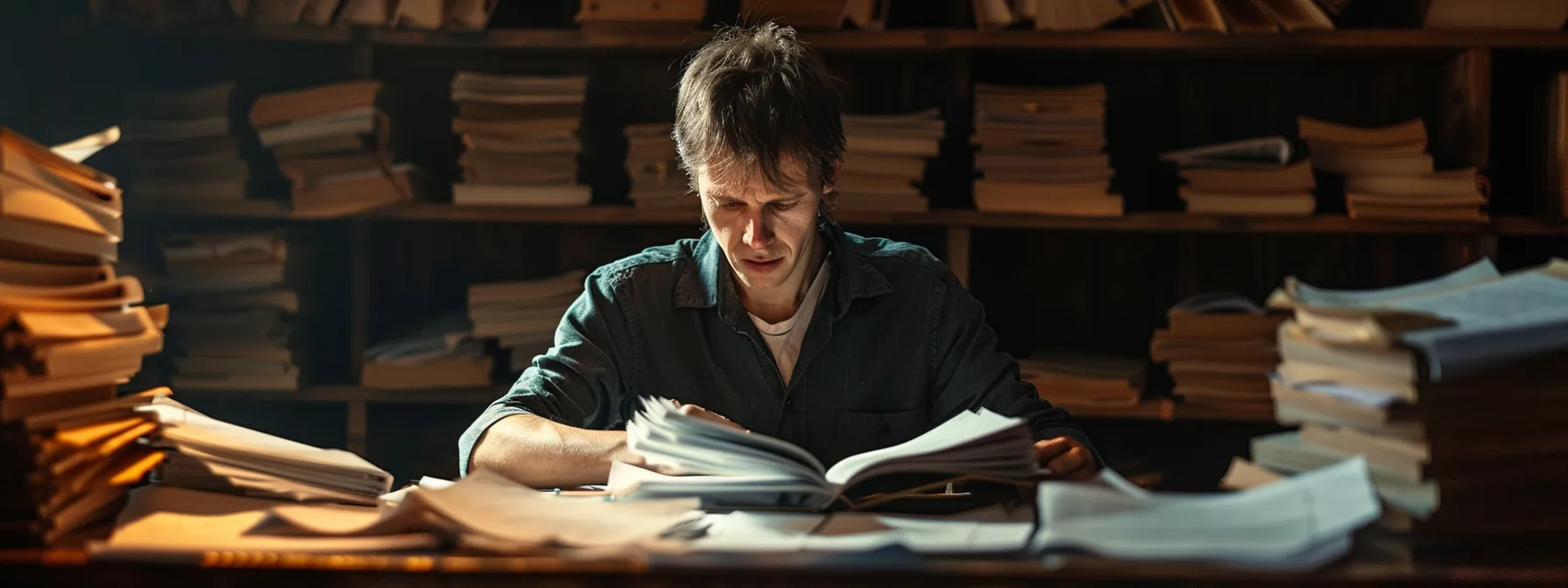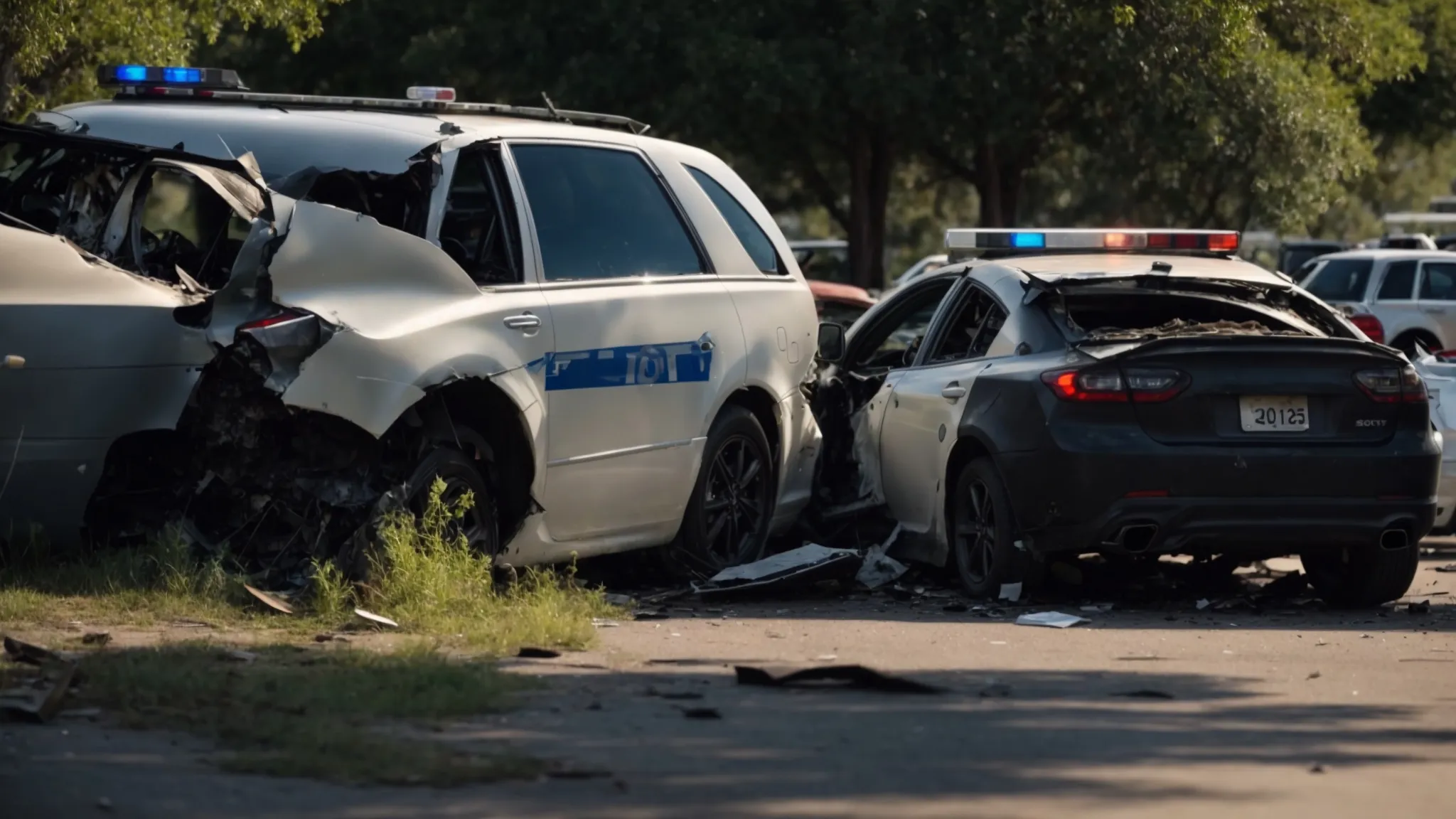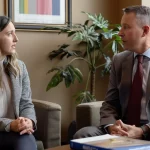Navigating the aftermath of a car accident in Texas can be overwhelming, especially when facing injuries, insurance claims, and possible legal action. Victims often endure considerable pain and uncertainty, wondering how to protect their rights and secure fair compensation. This guide will illuminate the immediate steps to take following an accident, clarify the nuances of Texas car accident laws, and explain your compensation rights. Attorney Robert J. Heil, with his deep expertise in car accident injuries and Texas law, stands ready to advocate for those affected by hit and runs and other motor vehicle incidents. By partnering with a seasoned attorney, you can navigate this challenging time with confidence, ensuring your voice is heard and your interests are vigorously defended.
Key Takeaways
- After a Texas car accident, swift safety checks and documentation are essential
- Understanding comparative fault laws is key to maximizing claim compensation
- Legal fees for personal injury cases often adhere to a contingency basis
- Gathering detailed evidence is critical for establishing liability in a car accident claim
- A well-prepared initial consultation with an attorney can significantly aid your legal strategy
Immediate Steps to Take Following a Car Accident in Texas

After a car accident in Texas, protect yourself and others by checking for injuries and ensuring safety; this may involve assisting Contact Heil Law Firm pedestrians. Swiftly make contact with law enforcement to have the incident officially recorded. Document the crash scene meticulously, considering it may impact the fee structure of any subsequent claims. Exchange essential information with all involved parties. Promptly inform your insurance, especially if dealing with a potential total loss or related slip and fall incidents. These immediate steps protect your legal rights and facilitate the process as detailed in the following sections.
Ensure Safety and Check for Injuries
Upon involvement in a car accident in Texas, one’s initial obligation is to ensure safety for all parties and assess any injuries incurred. It is imperative that individuals at the scene discreetly call for medical support if necessary, as this early intervention can mitigate risk and provide a documented account for one’s insurance policy. Acting promptly not only safeguards all involved from further harm but also establishes a clear record of the event’s immediate aftermath.
When the safety of accident victims is assured, it is crucial to document any injuries sustained, as this information can be a pivotal factor in both an insurance claim and a potential trial. Documentation should be thorough, including photographs if possible, and note-taking regarding the context of one’s employment or any trucks involved in the incident. This information is not only valuable for securing medical care and navigating insurance processes, but it will also serve as an essential resource in understanding and protecting your legal rights post-accident.
Contact Law Enforcement
After a car accident, engaging the police is a critical step. The official report they create is a key document for any insurance claim and potential court proceedings. This record could be decisive when addressing issues like driving under the influence which can heavily influence the outcome of a personal injury protection claim. Furthermore, adhering to the statute of limitations in Texas is essential, as failing to report an accident promptly may impair one’s capability to seek damages.
Contacting law enforcement immediately provides the advantage of an unbiased third-party assessment of the accident scene. The police will document the positions of vehicles, collect statements from witnesses, and assess any indications of traffic violations or impaired driving. Accurate police reports can also prove indispensable when insurance companies determine the fair market value of vehicles involved in the accident, ensuring that claimants receive a just compensation for their losses and damages.
Document the Accident Scene
Following a car accident, the importance of properly documenting the scene cannot be overstressed. Capturing images of the vehicles’ placement, any visible damage, and road conditions contribute to determining the actual cash value of claims and serve as evidence should a dispute arise regarding responsibility. This visual record can prove crucial when negotiating with insurance firms, especially if injuries have led to substantial medical bills.
Furthermore, individuals should collect contact information from witnesses and take detailed notes on their observations, ensuring the documentation is accessible for legal consultations. This level of thoroughness is indispensable as it may significantly impact the outcome of a free case evaluation with a personal injury attorney. Focusing on detailed documentation, even if they involve seemingly minor details like a shoulder injury, can make all the difference in protecting one’s rights and securing a fair settlement.
Exchange Information With Other Parties
Exchanging information with the other involved parties after a Texas car accident is essential for the subsequent processing of insurance policies and payment claims. It is crucial to procure the full name, contact details, insurance company, policy number, and the vehicle’s registration information from the other driver. If other drivers are injured or there are felony charges involved, this step becomes even more critical as it affects the percentage of fault and insurance compensation calculations.
Even in the chaotic aftermath of a collision, individuals should remember to obtain witness statements and their contact information, which can be invaluable if there are disputes over who was at fault or the extent to which someone was injured. Collect all pertinent data methodically to streamline the insurance claim process. This will establish a clear chain of events and facilitate any necessary legal proceedings.
Notify Your Insurance Company
Notifying your insurance company promptly after a car accident is a critical step towards protecting your rights, especially within Texas where contributory negligence can affect claims. Communicating information about your accident allows insurers to begin the subrogation process, potentially recovering costs from the party at fault. Ensure to report any instance necessitating surgery or an ambulance, as these can significantly influence your claim’s value.
When you contact your insurer, be prepared to provide a factual account of the incident, which may include the need for cash reimbursements for immediate expenses incurred. The details you offer help the company gauge the extent of the coverage, including medical payments for injuries requiring surgery or ambulance charges. The insurer’s swift action can also preempt complications tied to contributory negligence, which may muddy the waters about who owes what in damages.
- Ensure safety and check for injuries
- Contact law enforcement
- Document the accident scene
- Exchange information with other parties
- Notify your insurance company
Understanding Texas Car Accident Laws and Regulations

Navigating the aftermath of a traffic collision in Texas, individuals must understand their rights to take the correct legal actions. Familiarity with the statute of limitations is crucial for filing a lawsuit before the deadline expires. Texas’ comparative fault rules may also impact how much money one can recover after sustaining injuries. There is also a mandate to report certain accidents, as well as various legal obligations that must be promptly attended to following a collision. The following coverage offers insight into these legal elements, guiding victims through the process to protect their rights fully.
Statute of Limitations for Filing Claims
In Texas, the statute of limitations for filing claims following a car accident is a critical aspect of preserving one’s right to seek judgment. After an injury, victims have a specific timeframe within which they must file a lawsuit to recover the market value of their damages. This period is generally two years from the date of the accident, an essential deadline for those seeking justice, whether the collision involved a car, a bicycle, or any other hazard on the road.
Note that the statute of limitations may vary based on the claim type or involvement of a government entity. For example, injuries from a city-owned bicycle accident may have different filing deadlines. Understanding these time constraints is vital for victims to protect their legal rights and ensure timely compensation for injuries and losses.
Texas’ Comparative Fault Rules
In the event of car accident claims in Texas, understanding the comparative fault rules is essential. When an accident occurs, the state follows a modified comparative negligence system, meaning that the involvement and compensation of each party is contingent upon their degree of fault. For example, if a driver who was impacted by another motorist seeks therapy due to injuries from the accident and is deemed 30% responsible for the accident due to perhaps minor road infractions, the compensation they receive will be reduced by their share of the fault.
Comparative fault is particularly significant in incidents involving drunk driving where liability seems clear-cut. However, if the intoxicated driver argues that the other party’s actions, such as sudden braking or veering into another lane, contributed to the accident, the final settlement can be influenced by these contentions. Therefore, any individual involved in a Texas road accident must document all details of the event to effectively support their claim and navigate the complexities of comparative fault.
Mandatory Accident Reporting Requirements
In Texas, individuals who find themselves in the aftermath of a traffic accident must adhere to specific reporting requirements. A car accident claim necessitates prompt notification to law enforcement if the incident results in injury, fatality, or significant property damage. This legal obligation enables an authoritative assessment of the accident, ensuring that accurate information is on record, which can be critical when consulting a physician or legal counsel.
The United States law mandates that details of a traffic accident are reported to the transportation department if the accident is unattended by a police officer. It is crucial to gather and retain this information, as it forms the foundation for any subsequent car accident claim. Victims should promptly seek medical attention following a traffic incident, as a physician’s expert diagnosis and documentation can significantly augment a claim’s integrity and prospects for compensation:
- Report to law enforcement for official documentation and immediate assessment.
- Seek medical evaluation from a physician to corroborate injury claims.
Legal Obligations After an Accident
Once a car accident has occurred in Texas, individuals face certain legal obligations that must be fulfilled. Promptly remaining or returning to the scene to prevent charges related to hit and run is paramount, especially in cases where the accident has led to disability or significant damage. Undertaking these steps is not merely adherence to traffic laws, but it also paves the way for a smoother process when presenting your personal injury case in court.
Furthermore, providing reasonable assistance to those injured in a traffic accident is a duty under Texas law. This includes calling for immediate medical help if someone is incapacitated or injured. Failure to comply with these obligations can result in serious legal repercussions and impair one’s ability to achieve just compensation in a personal injury lawsuit:
| Legal Obligation | Outcome if Fulfilled | Outcome if Neglected |
|---|---|---|
| Remain at the Scene | Compliance with traffic laws / Enhanced case credibility | Potential criminal charges / Diminished legal standing |
| Assist Injured Parties | Aids in a compassionate court response / May support personal injury claims | Legal penalties / Compromise of moral and legal duty |
Your Rights for Compensation After a Texas Car Accident

In the aftermath of a car accident in Texas, individuals have the right to seek compensation that covers a spectrum of losses. Recovering medical expenses and rehabilitation costs is crucial, especially when testimony from healthcare professionals suggests long-term care may be required. Additionally, individuals can claim lost wages and future earnings if injuries prevent them from returning to work. Seeking compensation for pain and suffering acknowledges the stress and emotional toll the accident has exerted, while addressing property damage ensures restitution for vehicle or personal belongings damage. This segment provides an in-depth look at each of these rights, guiding victims through the law’s provisions for restoring their livelihoods post-accident.
Recovering Medical Expenses and Rehabilitation Costs
After a car accident in Texas, individuals have the right to recuperate expenses related to medical treatments, including those for conditions like whiplash, which are common in collisions. Thorough understanding of accident law is critical as it allows you to comprehend negligence and the scope of damages covered. Medical and rehabilitation costs can strain one’s finances, and liability insurance plays a key role in mitigating these burdens and ensuring rightful compensation for the affected.
This process of reimbursement for injuries sustained begins with accurately documenting all medical interventions, from emergency services to long-term rehabilitative therapy:
| Type of Medical Care | Documentation Required | Role in Claim Process |
|---|---|---|
| Immediate Treatment (e.g. ER visit) | Medical reports, bills, insurance filings | Establishes the direct impact of the accident and initial costs incurred |
| Rehabilitation/Therapy | Treatment plans, progress reports, expert testimony | Supports ongoing compensation for long-term recovery needs |
Victims of negligence in car accidents thus find legal provisions to recover funds spent on healing their injuries. It is indispensable for those affected to work closely with knowledgeable attorneys to navigate the complexities of liability insurance. With the aid of seasoned legal experts, victims can secure compensation not only for immediate medical care but also for the rehabilitative services often necessary to fully regain health and functionality.
Claiming Lost Wages and Future Earnings
In the aftermath of a collision, where distracted driving or other negligent behaviors have led to lost working hours, Texas law entitles individuals to claim lost wages from their insurance. The documentation of time away from work due to injuries sustained in a car accident case becomes pivotal. To solidify claims, providing employer statements and evidence of missed earning opportunities is essential for insurance adjusters and courts to evaluate rightful compensation.
Moreover, when injuries from a car accident lead to long-term disability or a disrupted career path, the potential for claiming future earnings arises. This accounts not only for immediate lost wages but also for the emergency adjustment of one’s professional trajectory. A detailed analysis, often requiring expert testimony, calculates the anticipated losses to ensure that insurance settlements address the full impact on an individual’s livelihood.
Seeking Compensation for Pain and Suffering
Seeking compensation for pain and suffering after a traffic crash in Texas requires proof of both physical and emotional distress. Victims must present evidence that substantiates the extent of their suffering to law enforcement and insurers, often necessitating detailed medical records and psychological evaluations. This aspect of a claim addresses the non-quantifiable impacts of an accident, from the trauma of a collision to the anguish associated with recovery.
In complex cases, such as those involving a wrongful death claim or substantial property damage, the expertise of a skilled lawyer is invaluable. Legal professionals can effectively navigate the nuances of Texas law to help victims include pain and suffering as a crucial component of their compensation. The success of such claims hinges on meticulously gathered and presented evidence that clearly demonstrates the life-altering consequences of the accident.
Addressing Property Damage
When contending with the repercussions of a car accident in Texas, addressing property damage swiftly becomes an integral aspect of the claims process. Engaging a lawyer skilled in navigating automobile insurance intricacies ensures your health and financial well-being aren’t further jeopardized by the chaos post-collision. The insurance company’s role is pivotal at this juncture, as it must equitably assess the damage to your vehicle or properties due to another’s fault and disburse funds that reflect the true cost of repairs or replacement.
Securing fair compensation for property damage often requires detailed negotiations with insurance adjusters and, at times, legal intervention to advocate for the rights of the client. Accessing a knowledgeable attorney’s expertise can be crucial, especially when there is a dispute over fault, or the insurance company disputes the claim’s validity. With the right legal advice, individuals can navigate the complexities of automobile insurance, ensuring that their health and fiscal stability remain intact following an accident.
Navigating Insurance Claims in Texas

In the wake of motor vehicle accidents, understanding insurance claim procedures is vital for Texas drivers. Victims must promptly file a claim with their insurance provider, navigate the intricacies of dealing with the other party’s insurer, and grasp the nuances of uninsured and underinsured motorist coverage. Moreover, effective communication with insurance adjusters is vital when health care costs, passenger injuries, and property damages are involved. This section offers practical advice on these critical steps to ensure rightful compensation following a collision.
Filing a Claim With Your Insurance Provider
Initiating a claim with your insurance provider is the first step towards financial recovery after a vehicle accident in Texas. Statistics underscore the necessity of this action, acknowledging a heightened occurrence of incidents where alcohol and brain injuries prevail. Addressing vehicle damage promptly with your insurer not only communicates attention to detail but also catalyzes the assessment and repair process, mitigating further inconvenience and potential depreciation of your asset.
The path to filing a claim while navigating the complexities of insurance protocol demands precision and clarity. When communicating with your provider, it is crucial for individuals to elucidate the extent of the collision’s impact, thereby enabling the insurance company to act with the information needed to evaluate vehicle damage. This diligence ensures that one’s right to compensation is solidified, empowering victims to focus on recovery with peace of mind.
Dealing With the Other Party’s Insurance Company
Interfacing with the opposing party’s insurance company can be a pivotal moment in the quest for indemnification after a vehicle incident. It is essential for individuals to understand that giving recorded statements without guidance might compromise their claim due to the intricacies of comparative negligence. Instead, a strategic approach should involve presenting evidence such as health insurance claims, witness statements, and reports from the law enforcement officer who documented the collision site.
When Texas residents handle claims with another party’s insurer, they must be vigilant about what details are shared and how they are interpreted. It’s advisable to let a proficient legal representative step in; they can seamlessly handle all dialogue and negotiation, ensuring your interests remain protected. This representative will employ their expert knowledge to dissect and challenge any comparative negligence allegations that could hinder the rightful recovery for vehicle damage and medical expenses:
| Claim Aspect | Client’s Responsibility | Legal Representative’s Role |
|---|---|---|
| Communication | Provide accurate information | Navigate negotiations and protect client interests |
| Evidence Submission | Gather documentation | Analyze and present supportive evidence |
| Comparative Negligence | Understand potential impact | Counteract allegations and assert facts |
Understanding Uninsured and Underinsured Motorist Coverage
In the midst of the chaos following a car accident in Texas, victims may encounter the added complication of the at-fault driver lacking sufficient insurance to cover the expense of the victim’s losses. Uninsured and underinsured motorist coverage becomes pivotal in such cases, ensuring victims can still recoup costs for medical bills, motorcycle repairs, and compensation for pain and suffering without having to bear the full financial burden themselves.
When the accident scene has cleared and the focus turns to recovery, understanding the nuances of uninsured and underinsured motorist coverage is essential to navigating product liability and other intricate aspects of insurance claims. This coverage acts as a safety net, offering victims a path to securing the funds needed for rehabilitation and restitution, even when the party at fault cannot provide complete financial reparation.
Tips for Communicating With Insurance Adjusters
When you find yourself on the telephone with an insurance adjuster after a car accident injury, it’s crucial to remain calm and detail-oriented. Carefully articulate the facts as documented by the responding police officer, and refrain from speculating about the incident or discussing any potential contingent fee arrangements with your attorney. Staying focused on the specifics of the highway event allows you to communicate effectively, avoiding discrepancies that could affect your claim.
It’s essential to remember that the insurance adjuster’s role is to evaluate the claim for the insurance company, which often involves minimizing payouts. To safeguard your interests, provide clear and concise information about your car accident injury. Avoid sharing unnecessary details. If the conversation veers into areas beyond the immediate facts or into the realm of settlement offers, consider deferring such discussions until after you have consulted with your personal injury attorney.
Determining Fault in Texas Car Accidents

Establishing liability after a motor vehicle accident is a cornerstone of Texas law, directly affecting car accident victims’ claims for lost wages and compensation for suffering. The Heil Law Firm provides expertise in deciphering the critical impact of comparative negligence on these claims. Gathering robust evidence, including police reports and witness statements, is instrumental in supporting your case. This section delves into how culpability is assigned, elucidating the defendant’s role and bolstering car accident victims’ rights to a fair settlement.
How Liability Is Established
Establishing liability after a car accident in Texas is a complex process that begins with a meticulous investigation of the incident. The collection of evidence, such as traffic camera footage, vehicle damage assessments, and eyewitness accounts, plays a crucial role in determining which party breached their duty of care on the road. The Heil Law Firm specializes in dissecting these details to advocate for their clients, ensuring that Personal Injury Services effectively pinpoint responsibility and secure the rightful compensation for victims.
In instances where the fault is not immediately apparent, liability is often established through the nuanced analysis of state traffic laws and accident reconstruction findings. Those affected by car accidents can seek the expertise of the Heil Law Firm, where seasoned professionals adept in personal injury services utilize their skills to navigate the complexities of Texas liability law, aiming to prove negligence and uphold the best interests of their clients.
Impact of Comparative Negligence on Your Claim
In Texas, when attributing fault in a car accident, the comparative negligence system may influence the damages one can recover. If a party is partially at fault, their compensation reduces by their percentage of fault. For instance, if a claimant is deemed 10% responsible in a collision and the damages amount to $100,000, they would receive $90,000. It is critical for those involved to gather concrete evidence and present a well-founded argument to minimize their assigned fault, thereby maximizing their entitled restitution.
Comprehensive understanding and strategic presentation of one’s case are vital in the face of Texas’ comparative negligence laws. The assistance of an experienced personal injury attorney is often instrumental in negotiating with insurance companies. Such expertise can lead to a more favorable outcome by accurately demonstrating the extent of the other party’s culpability, ensuring fair compensation for medical expenses, lost income, and other related costs arising from a car accident.
Gathering Evidence to Support Your Case
To determine fault in the aftermath of a Texas car accident, compiling a strong evidence portfolio is crucial. Photographs of the accident scene, witness statements, and detailed medical reports form the bedrock of a compelling case, providing irrefutable documentation of the circumstances and impact of the collision. Engaging a personal injury attorney early ensures this evidence is preserved and well-organized, which can be pivotal when negotiating with insurance companies or presenting in court.
The preservation and presentation of evidence can greatly influence the attribution of fault, and consequently, the recovery of damages. For instance, a driver’s dash cam footage, paired with the responding officer’s accident report, can offer clear insights into liability, serving as indispensable assets in a personal injury claim. This evidence establishes a narrative, reinforcing the victim’s position and streamlining the path to just compensation for their losses.
Role of Police Reports and Witness Statements
Police reports often act as key evidence in establishing fault in Texas car accidents, providing an official account of events from an objective third-party authority. This documentation contains vital details such as driver statements, weather conditions, and any traffic law violations, which become essential in the insurance claim process and during any legal disputes that may arise.
Similarly, witness statements can significantly bolster a car accident claim by offering corroborating accounts of the incident from individuals who saw what happened. The clarity and testimonies provided by witnesses help in painting a complete picture of the event, supporting the victim’s recollection and challenging discrepancies that might affect the determination of liability.
Seeking Legal Representation After a Car Accident

After a car accident in Texas, understanding when to consult a car accident attorney is crucial for protecting your rights and maximizing compensation. This section will guide you through selecting the right legal professional, deciphering the complexities of legal fees and costs, and preparing for your initial consultation. These steps are fundamental to ensure you have the necessary legal expertise to navigate the aftermath of a collision effectively and secure the justice you deserve.
When to Consult a Car Accident Attorney
Consulting a car accident attorney becomes imperative when injuries are significant or the path to compensation is unclear. Victims in Texas should promptly seek legal counsel to navigate comparative negligence laws and preserve their rights. A knowledgeable attorney assesses the situation, offers strategic advice, and initiates timely legal action to secure just compensation for damages and injuries suffered.
While the insurance process can be intricate and taxing, an experienced car accident attorney provides clarity and support. If you’re grappling with insurance adjusters, facing complex legalities, or if the accident involves issues like DUI or commercial vehicles, professional legal assistance boosts the likelihood of a favorable outcome. Retaining a lawyer early helps protect against potential pitfalls, allowing victims to focus on recovery:
- Early assessment of case merits and the appropriate legal strategy
- Guidance during interactions with insurance companies
- Comprehensive pursuit of owed compensation for injuries and damages
Choosing the Right Legal Professional
The selection of a qualified legal professional is paramount after experiencing a vehicular mishap. Focusing on a lawyer who specializes in personal injury or car accident law within Texas not only ensures relevant expertise but also brings a deep understanding of state-specific regulations that will influence the outcome of your case. Such professionals are adept at negotiating with insurers and presenting your case in court, if necessary.
In the intricate aftermath of a Texas car accident, it is advisable to consider a legal professional’s track record and client testimonials. A lawyer with a history of favorable settlements and verdicts can offer a substantial advantage. They bring not just knowledge of the law but also the practical experience of navigating the legal intricacies and procedural nuances associated with car accident claims.
Understanding Legal Fees and Costs
Understanding legal fees and costs is an essential factor for victims seeking representation after a car accident in Texas. Personal injury attorneys often operate on a contingency fee basis, meaning they receive a percentage of the settlement or court award rather than charging upfront. This arrangement aligns the lawyer‘s financial incentive with the client’s success and allows access to legal services without the burden of immediate expenses.
Additionally, it is important to note that other costs may be associated with a legal claim, such as filing fees, costs to obtain medical records, and expert witness fees. The settlement typically pays these expenses, and clients should discuss with their attorney how to handle them.
Transparency about all potential fees and costs provides clarity and ensures those affected by car accidents make informed decisions about their legal representation.
Preparing for Your Initial Consultation
Preparing for your initial consultation with a car accident attorney sets the stage for a successful legal journey in Texas. Gather all relevant documents, including a copy of the police report, photographs of the accident scene, and any medical records related to your injuries. This preparation allows the attorney to effectively evaluate your case and offer informed guidance on navigating the complex terrain of personal injury claims.
Write down your questions or concerns before meeting your lawyer to ensure a focused and productive discussion. This preparation clarifies the next steps and helps you secure the compensation you rightfully deserve. A well-prepared initial consultation can significantly enhance your understanding of the legal process and what to expect as your case moves forward:
| Preparation Aspect | Why It’s Important | How It Helps |
|---|---|---|
| Collecting Documentation | Provides the foundation of your case | Enables precise assessment of your situation |
| Listing Questions and Concerns | Ensures all your doubts are addressed | Lays out a clear strategy for your claim |
Conclusion
Understanding your rights after a car accident in Texas is essential for navigating the legal complexities and securing the compensation you deserve. The prompt actions of exchanging information, documenting the scene, and contacting law enforcement can significantly influence the outcome of your claim. Familiarity with Texas’s comparative fault rules and the statute of limitations ensures you protect your entitlements and act within crucial timeframes. Ultimately, consulting with a knowledgeable car accident attorney early in the process can provide the strategic guidance necessary to uphold your legal rights and facilitate a favorable resolution.







